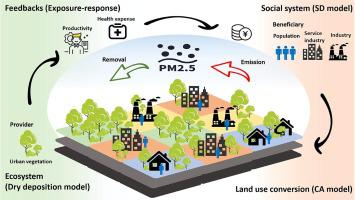Ecosystem Services ( IF 6.1 ) Pub Date : 2020-12-31 , DOI: 10.1016/j.ecoser.2020.101234 Xiangyu Luo , Peng Jiang , Jingyi Yang , Jing Jin , Jun Yang

|
To incorporate the concept of ecosystem services into the planning and management practices has been proposed as a way to improve the management of urban ecosystems. Nevertheless, the uptake of the idea is slow due to the many political and technical barriers. One of the technical barriers is the lack of tools for cities to predict the impacts of proposed policies and actions on urban ecosystem services. To address this gap, we have developed an urban ecosystem service model based on the social-ecological model framework. Using the PM2.5 removal service in Beijing, China as an example, we showed how this model could be used to simulate the impacts of different policy scenarios on the specified ecosystem service. Our simulation results show that he PM2.5 removal service contributed by the city’s ecosystem can help to lower PM2.5 emissions from its social system, which formed a positive feedback. The PM2.5 removal service provided by urban green spaces from 2016 to 2035 in Beijing vary significantly among the three policy scenarios, including business as usual, restricting urban growth, and adjusting the energy structure. Based on the projections of the PM2.5 removal service, we concluded that Beijing should give priority to the policy of restricting the urban growth through urban planning. Our study showed that the feedback effects of ecosystem services are significant in a long term. Also, the model developed in this study provides a useful tool to simulate the impact of urban planning and management on urban ecosystem services.











































 京公网安备 11010802027423号
京公网安备 11010802027423号